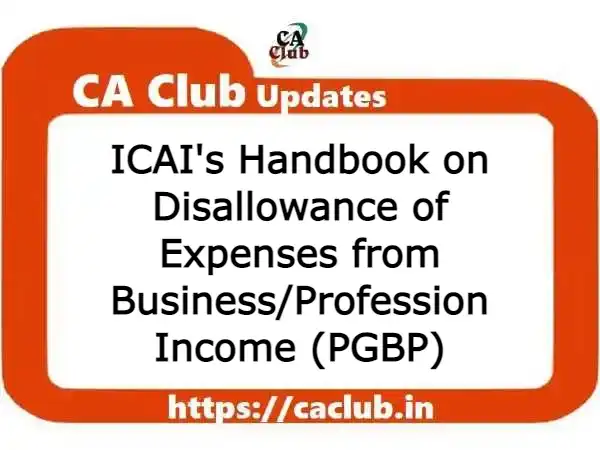As a business owner, it is critical to understand the provisions of the Income Tax Act, 1961 relating to the disallowance of expenses when calculating taxable income under the heading “Income from Business or Profession.” The Direct Taxes Committee of the ICAI has published the “Handbook on Disallowance of Expenses Under the Head Income from Business or Profession” to assist the fraternity in properly calculating income under this head.
Introduction to Disallowance of Expenses
Expenditure refers to a cost associated with an accounting period’s operations, the revenue earned during the period, or the benefits of which do not extend beyond the period. The Income Tax Act 1961 defines two types of expenses: allowable and disallowed. Allowable expenses are those that can be deducted when calculating taxable income under the heading “Income from Business or Profession,” whereas disallowed expenses cannot be deducted and the amount is added to the income that must be taxed.
The provisions for disallowance of expenses are overriding and must be applied first. The first requirement in determining whether a particular expenditure is deductible or not is to determine whether the deduction is expressly prohibited under any other provision of the Income Tax Act. If the expenditure is not prohibited, it can be deducted from taxable income. However, if any expenditure is not allowable due to any provisions, it cannot be claimed. Certain expenses are prohibited by specific and general provisions.
Reasons for Disallowance of Expenses
There are several reasons why expenditure will be prohibited. Non-compliance with the provisions of the law, such as expenditure on which TDS should have been deducted and paid but has not been deducted and paid; incurring cash payments exceeding Rs.10,000; certain expenditure allowed on payment basis only; interest on delay in payment of TDS; and delay in remitting ESI and PF contributions to the government are some of them. Personal expenses cannot be claimed as business expenses. Another reason is a lack of proper maintenance of documents such as vouchers and invoices for expenses incurred.
Implications of Disallowance of Expenses
If a specific expense is disallowed, the amount will be treated as income and taxed at 30% + surcharge + cess. This becomes an additional burden for the assessee. As a result, it is the assessee’s responsibility to follow the law’s provisions and ensure that they can claim the expenses. To avoid an additional tax burden, the assessee should claim only those expenses that are allowable.
ICAI’s Guide/Handbook on Disallowance of Expenses
The ICAI’s “Handbook on Disallowance of Expenses Under the Head Income from Business or Profession” is a valuable tool for businesses and professionals to understand the provisions of the Income Tax Act, 1961, relating to disallowance of expenses. To avoid any additional tax burden, it is critical to follow the law’s provisions and claim only allowable expenses. Businesses and professionals can ensure proper income calculation under this heading by following the guidelines provided in the Handbook. This publication provides members with subject-specific guidance and information.
Conclusion
Finally, understanding the provisions of allowable and disallowable expenses is critical for businesses to make proper computations when filing income tax returns. The Handbook on Disallowance of Expenses under the heading Income from Business and Profession is a valuable resource for professionals, providing guidance on the subject matter as well as other related information. Businesses can avoid the consequences of disallowance of expenses and avoid any additional tax burden by following the provisions of the law and claiming only allowable expenses.
ICAI’s Handbook on Disallowance of Expenses under the head Income from Business and Profession (February 2023)
